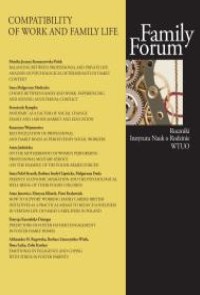How to support working family carers? British initiatives as a practical means to reduce loneliness in everyday life of family caregivers in Poland
How to support working family carers? British initiatives as a practical means to reduce loneliness in everyday life of family caregivers in Poland
Author(s): Anna Jankowicz, Martyna Klimek, Piotr KrakowiakSubject(s): Labor relations, Health and medicine and law, Family and social welfare, Human Resources in Economy, Socio-Economic Research
Published by: Uniwersytet Opolski
Keywords: Carers UK; Employers for Carers; end-of-life care; home care; family carer; loneliness; isolation; inclusion; employers; juggling work and care; respite care; Covid-19;
Summary/Abstract: Background: Research shows challenges for family caregivers in end-of-life care in Poland, who often lack recognition and support, especially in home care settings (Janowicz, 2019a). The Government published documents in support of family caregivers for the first time in 2019, recognizing respite care and allocating money to some of them. Poland has successfully implemented British standards of hospice and palliative care; the same could be done in supporting family carers (Krakowiak, 2020a). Goals: Learning from the experience of the British organisation Carers UK, who have been operating successfully for more than 50 years working towards inclusion of formal and informal care (Klimek, 2020). Studying educational strategies of supporting carers in the UK, in order to help creating possible solutions to this social and educational challenge in Poland. Implementing good practices in order to reduce the loneliness of carers in the home care settings, especially when carers have to juggle their work with demands of care. Methodology: Study of various activities and newest facts and figures from documents of Carers UK point out to existing strategies used for and by employers. Those regarding combining care and work are crucial for recognising the needs of working carers. Recent research carried out in the UK and Poland show the scale of modern social problems, where most families still feel isolated, while local communities do not support those who care, often for many months and years. If the UK companies could save up to £4.8 billion a year in unplanned absences and a further £3.4 billion in improved employee retention by adopting flexible working policies to support those with caring responsibilities (Carers UK, 2019b), introduction of the same mechanisms could be helpful for businesses and working caregivers in Poland (especially following the increased employers’ flexibility during the Covid-19 pandemic). Presentation of tools used by the British employers and benefits of combining care and work clearly show the chances for working carers, sharing their job with the duty of constant care at home. Results & conclusions: Juggling work with care happens to the growing number of carers in the UK and in Poland. Action is urgently needed in Poland, where many people do a fulltime job alongside caring at home.
Journal: Family Forum
- Issue Year: 2021
- Issue No: 11
- Page Range: 129-150
- Page Count: 22
- Language: English

